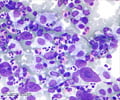Researchers have designed a new class of drugs that targets BCL6, a master regulatory protein responsible for causing the most common type of non-Hodgkin's lymphoma.
Researchers from the Sackler Center at Weill Cornell Medical College have designed a new class of drugs that targets BCL6, a master regulatory protein responsible for causing the most common type of non-Hodgkin's lymphoma.
Published in issue of Cancer Cell, the study shows that an experimental compound designed by a team of researchers from Weill Cornell Medical College, the University of Maryland and the Ontario Cancer Center at the University of Toronto may effectively block the cancer-causing actions of BCL6 by attaching to a critical "hot spot" on its surface, thus killing off the cancer cells."BCL6 mediates its cancer-causing actions by attaching to other proteins," explains Dr. Ari Melnick, associate professor of medicine from the Raymond and Beverly Sackler Center for Biomedical and Physical Sciences at Weill Cornell Medical College. "Traditionally protein-protein interactions have been viewed as being too difficult to block with small-molecule drugs."
Accordingly, by observing the atomic scale structure of BCL6 attached to its partner proteins, Dr. Melnick and colleagues identified a critical "hot spot" that appeared to be amenable to designing a drug.
Dr. Alexander Mackerell, from the University of Maryland, then used computational modeling to identify chemical structures that could attack this hot spot.
"We tested the ability of a large number of these chemicals to bind and block BCL6," said Dr. Melnick, "and then Dr. Gilbert Privé, from the University of Toronto, performed nuclear magnetic resonance and X-ray crystallography studies to show that a specific BCL6 inhibitor compound hit exactly in the center of the predicted hot spot. Our results show that given the right scientific approach it is quite possible to design drugs against key protein regulatory factors like BCL6."
Dr. Melnick's group showed that the BCL6 inhibitor was specific for BCL6 and did not block other master regulators, and that the experimental drug could powerfully kill DLBCL cells derived from human patients with this disease. Remarkably, the compound was completely non-toxic to animals, and could powerfully suppress and improve survival in animal models.
Advertisement
Source-ANI
THK












